Books by Georgios Kesisoglou
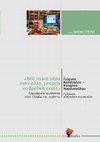
Red Marks , 2019
Το βιβλίο αυτό φιλοδοξεί να χαρτογραφήσει κριτικά τις ανταγωνιστικές αφηγήσεις περί εργασίας και ... more Το βιβλίο αυτό φιλοδοξεί να χαρτογραφήσει κριτικά τις ανταγωνιστικές αφηγήσεις περί εργασίας και επισφάλειας στο λόγο των νέων εργαζομένων στην Ελλάδα της «κρίσης».
Με ποιους τρόπους κατανοούν και περιγράφουν τις συνθήκες επισφαλούς εργασίας; Πώς αντιλαμβάνονται την αμειβόμενη εργασία και από ποιους συμβολικούς πόρους αντλούν για να μιλήσουν για τις εργασιακές ταυτότητές τους; Υπάρχουν εναλλακτικά εργασιακά φαντασιακά;
Απέναντι στα ερωτήματα αυτά, οι συγγραφείς δίνουν το λόγο στις εργαζόμενες-ους και αναλύουν τις αφηγήσεις τους, χρησιμοποιώντας εργαλεία της κριτικής λογοψυχολογίας. Την ίδια στιγμή, υπερβαίνοντας τα όρια της κοινωνικής ψυχολογίας, επιχειρούν να αναδείξουν τις νοηματοδοτήσεις της εργασίας που νομιμοποιούν το status quo και να εντοπίσουν εκείνες που αμφισβητούν το κυρίαρχο εργασιακό ήθος. Η ανάλυσή τους φωτίζει τις σκιές της σύγχρονης μεταδημοκρατικής συνθήκης, εμβαθύνοντας στις διαδικασίες συγκρότησης του «νεοφιλελεύθερου υποκειμένου», μέσα από ένα χειραφετητικό κριτικό πρίσμα.
Όπως σημειώnει ο Αλέξανδρος Κιουπκιολής στον πρόλογο, ανάμεσα σε άλλα:
«Η παρούσα μελέτη της Κατερίνας Νικολοπούλου και του Γιώργου Κεσίσογλου για την εργασία και τις ταυτότητες στην Ελλάδα της κρίσης είναι μια δημιουργική και επίκαιρη συμβολή σε αυτή την «άλλη» έρευνα, η οποία φωτίζει διαφορετικά το πολιτικό και διανοίγει εναλλακτικούς ορίζοντες στην πολιτική σκέψη και δράση. Αξιοποιώντας τη μεθοδολογία και το εννοιολογικό οπλοστάσιο της κριτικής λογοψυχολογίας και δουλεύοντας με ημιδομημένες συνεντεύξεις, χαρτογραφούν τους ποικίλους και αντιφατικούς τρόπους με τους οποίους σύγχρονα υποκείμενα της εργασίας νοηματοδοτούν και διαχειρίζονται την κρίση, την ίδια την εργασία και την υποκειμενική θέση τους σε αυτή ως εργαζόμενοι/ες (…) Η μελέτη της Νικολοπούλου και του Κεσίσογλου δεν μνημονεύει απλώς αυτή τη συντακτική «βιοεξουσία από τα κάτω» που στέκεται απέναντι στη νεοφιλελεύθερη ηγεμονία. Αποτελεί η ίδια ζωντανή μαρτυρία της, τεκμήριο της πραγματικής δυνατότητας για μια άλλη συν-εργασία που δημιουργεί με χαρά και κόπο, παράγοντας από κοινού όχι μόνο μεταξύ των εμφανών πρωταγωνιστών (εδώ, των συγγραφέων) αλλά και με την κοινωνική πολλαπλότητα (εδώ, τις συνομιλήτριες και τους συνομιλητές).»
Ιστορία, Θεωρία και Προοπτικές για τη συνοδοιπορία Έρευνας και Αγώνα
Papers by Georgios Kesisoglou
This paper is pursuing an overview of the emergence of the notion of "precarity" or &qu... more This paper is pursuing an overview of the emergence of the notion of "precarity" or "precarious work" in the academic discourse of social sciences. By incorporating precarity in a historical context of labour transformation, we examine both the linguistic origin of the word and the archaeology of its use from the first time, by Bourdieu in 1963 until the President of the American Sociological Association in 2009. A brief presentation is devoted to the critics of the term's use, in feminist and labour movement historiography. Greek data on precarious work are provided concerning three specific time periods: first in the midst of the 1990s and 2000s acting in comparison to the two years of crisis (2010 – 2011). Finally, this paper ends by discussing how theories of precarious work could benefit political psychology.
Συνήθως διαπιστώνεται μια μεγάλη απόσταση ανάμεσα στον αγώνα για τη χειραφέτηση της εργατικής τάξ... more Συνήθως διαπιστώνεται μια μεγάλη απόσταση ανάμεσα στον αγώνα για τη χειραφέτηση της εργατικής τάξης και στην έρευνα που παράγεται στα πανεπιστημιακά πλαίσια. Ακόμα και αν, ως κοινωνική, η έρευνα έχει ως αντικείμενο τις συνθήκες εργασίας και ζωής της εργατικής τάξης, ο συνηθισμένος κανόνας είναι η αντικειμενοποίηση των υποκειμένων της τάξης, η εξουδετέρωση της κίνησης και της δράσης τους, η εξ-ουδετέρωση της δράσης και της κίνησης των ερευνητών, η απομάκρυνση ή δεοντική απαγόρευση της όποιας προοπτικής συνεργασίας, συν-έρευνας, ή κοινών συμφερόντων ερευνητών - ερευνώμενωνi. Στο άρθρο λοιπόν αυτό θα υπάρξει μια προσπάθεια για μια ενδεικτική επισκόπηση των μονοπατιών που συνδυάζουν την ερευνητική επιστημονική προσπάθεια με τον χειραφετητικό αγώνα.
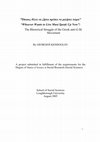
This thesis is concerned with the rhetoric of the Greek anti-GM social movement. In the research,... more This thesis is concerned with the rhetoric of the Greek anti-GM social movement. In the research, documents from web-sites concerned with, and coming from the Greek struggle against G.M.Os were systematically collected, namely from the websites of Greenpeace and the Pan-Hellenic Movement against Genetically Modified Organisms. What is compelling in the Greek case is the outright governmental ban on all G.M.O. releases after a massive media outcry, in a country where, according to recent Eurobarometers, the knowledge about the effects of biotechnology and genetic engineering is very low and there is little or no debate prior to the introduction of new technologies. In fact, pursuing an in-depth, critical discourse analysis of the documents, what I prefer to call 'hermeneutics of suspicion', I have come up with certain rhetorical techniques of the Greek anti-G.M. movement. In general, these techniques consisted of the establishment of shared categories, of terms such as the “m...
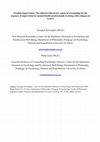
Greece in the past three years has been put in a position to address a massive and overwhelming i... more Greece in the past three years has been put in a position to address a massive and overwhelming influx of refugees moving mostly from the war afflicted areas of Syria, Afghanistan and Iraq. Such a massive movement came at a time of the most severe financial crisis, when little state attention or funding could be provided for the medical, mental health and psychosocial care, accommodation and integration of migrants or refugees. This condition opens up many issues for qualitative inquiry both with the mental health professionals as well as on the organisation of psychosocial services. The proposed submission draws on an ongoing post-doctoral project on the supervision needs and best practices of the mental health professionals working in the Greek refugee regime. We will focus on the accounts of mental health professionals who participated in the pilot phase of this project. Our data comes from a corpus of 35 in-depth, qualitative interviews, effected through purposive homogeneous sa...
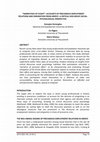
International journal of employment studies, 2016
Recent survey data attest that young professionals and graduates massively opt to emigrate from c... more Recent survey data attest that young professionals and graduates massively opt to emigrate from crisis-ridden Greece. Drawing on interview data by young professionals (18-26 years old), in urban centres of Greece, this study attempts to explore the discursive practices which informants mobilise to account for the prospect of migrating abroad, as well as the constructions of agency and subjectivity within these ways of accounting. Analysis drawing on insights from critical discursive social psychology indicates that participants articulate a 'narrative of personal effort': a) by characterising and evaluating through metaphors of the Greek labour and migration regime as context; b) by asserting their effort and agency, tracing their mobility to their psychological properties; while c) accounting for the ambivalence of 'fight or flight'. Analysis also points out how participants orient themselves to a dilemma of stake and accountability, being concerned to position them...
Συνήθως διαπιστώνεται μια μεγάλη απόσταση ανάμεσα στον αγώνα για τη χειραφέτηση της εργατικής τάξ... more Συνήθως διαπιστώνεται μια μεγάλη απόσταση ανάμεσα στον αγώνα για τη χειραφέτηση της εργατικής τάξης και στην έρευνα που παράγεται στα πανεπιστημιακά πλαίσια. Ακόμα και αν, ως κοινωνική, η έρευνα έχει ως αντικείμενο τις συνθήκες εργασίας και ζωής της εργατικής τάξης, ο συνηθισμένος κανόνας είναι η αντικειμενοποίηση των υποκειμένων της τάξης, η εξουδετέρωση της κίνησης και της δράσης τους, η εξ-ουδετέρωση της δράσης και της κίνησης των ερευνητών, η απομάκρυνση ή δεοντική απαγόρευση της όποιας προοπτικής συνεργασίας, συν-έρευνας, ή κοινών συμφερόντων ερευνητών - ερευνώμενωνi. Στο άρθρο λοιπόν αυτό θα υπάρξει μια προσπάθεια για μια ενδεικτική επισκόπηση των μονοπατιών που συνδυάζουν την ερευνητική επιστημονική προσπάθεια με τον χειραφετητικό αγώνα.

The purpose of this qualitative study was to explore the ‘neo-homeless’ participants’ lived exper... more The purpose of this qualitative study was to explore the ‘neo-homeless’ participants’ lived experiences in the shelters and the streets, within the context and the adversities of the economic crisis in Greece. Semi-structured interviews were conducted with 6 participants (4 women and 2 men) at a municipal shelter in Athens, Greece. An Interpretative Phenomenological analysis was used to document their experiences and stories. Research findings revolved around the accounts and the negative effects of neo-homelesness such as detrimental personal consequences, stress, depression, depersonalization , a sense of hopelessness and lack of hope for the future. However, the participants spoke also about positive growth, a deeper apprehension of life’s meanings, and the mobilization of personal and interpersonal resources. ‘Neo-homelessness’ hardship in the shelter was incremental in the experiential conscientization and critical consciousness of the oppression of the social context of crisis...

Όταν εμφανίστηκε το καλοκαίρι του 2018 στις προθήκες το βιβλίο του Δημήτρη Παπανικολάου, αμέσως τ... more Όταν εμφανίστηκε το καλοκαίρι του 2018 στις προθήκες το βιβλίο του Δημήτρη Παπανικολάου, αμέσως τράβηξε την προσοχή μου. Αυτή η έκφραση, «κάτι τρέχει με την οικογένεια», μαζί με τα προσδιοριστικά του τίτλου, «έθνος, πόθος και συγγένεια την εποχή της κρίσης» ήταν σαν ένα κάλεσμα για μένα, το οποίο απευθυνόταν σε διάφορες αμφιβολίες και ελλείψεις που αντιλαμβανόμουν αναφορικά με τη σύγχρονη θεωρία της οικογένειας στην Ελλάδα. «Κάτι τρέχει», που ξεφεύγει από τον αναλυτικό φακό μας. Ξεφυλλίζοντας το στο βιβλιοπωλείο, είδα με πολύ ενδιαφέρον ότι ο συγγραφέας δεν συζητούσε κλινικές περιπτώσεις ή τη βιβλιογραφία για την οικογένεια, αλλά σύγχρονα ‘πολιτισμικά κείμενα’, ταινίες, βιβλία, κλπ, οικεία σε μένα, που με είχαν αναστατώσει τα περισσότερα όταν τα είχα συναντήσει. Δεν μας γράφει από το χώρο των ψυ-επιστημών, αλλά από τις πολιτισμικές σπουδές και τη Νέα Ελληνική Φιλολογία, διδάσκοντας Νεοελληνική Λογοτεχνία στο κολέγιο St.Cross της Οξφόρδης από το 2004. Σε αυτή τη (εκτενή ίσως) δοκιμια...

Discourse & Society, 2016
artists Rirkrit Tiravanija, Santiago Sierra and Jeremy Deller, and the real-time experiences of p... more artists Rirkrit Tiravanija, Santiago Sierra and Jeremy Deller, and the real-time experiences of people participating in their artwork. Round, in Chapter 5, highlights the fourdecade story of ‘our man’ (p. 95) Harvey Pekar’s American Splendor and the examination by this comic of the ‘universal experience and the individual human condition’ (p. 95). Part 3 considers the politics associated with representing real people in research and in telling real people’s stories. Chapter 6 discusses the paradox of the ethnographer as Lambrou recounts her experience of researching personal experiences of trauma while interviewing individuals who experienced the 2005 subway bombing in London and the 9/11 terrorist attacks in New York City. In Chapter 7, Lilleker examines the oral tradition of political storytelling by focusing on the narratives of Barack Obama and his brand during the 2008 US presidential election campaign. Chapter 8, by Kimber, investigates the cult of celebrity and the blurring of fact and fiction in documenting the story of serial killer Henry Lee Lucas in three films that present his life and crimes. Part 4, ‘celebrity lives reimagined’, explores celebrities’ lives and the blurring of fact and fiction by fans, relatives and cities narrating particular celebrity stories. In Chapter 9, Thomas reviews Real Person Fiction (RPF), a subgenre of fanfiction, and the muddied boundaries of public and private for the celebrities starring in these stories. The author presents the ethics and aesthetics used by writers and readers of the genre. Chapter 10, by Pearson, theorizes celebrity studies and memory studies by examining the continued posthumous circulation of Frank Sinatra’s celebrity image by family and fans, as well as official and unofficial commemorations in various cities affirming a connection to the singer. This well-organized volume provides a number of case studies that seek to overcome critical and conceptual divisions traditionally found between narrative theorists and media and cultural theorists. The volume accomplishes this by highlighting studies that draw on narrative, linguistic, media, film and cultural theories, while examining a wide range of media. The chapters probe the notion of ‘fixed boundaries’ (p. 2) between these theories and their traditional disciplines, while also probing categories of fiction/nonfiction, author/reader and self/other. Rather than separating ‘real people’ and ‘celebrities’, this volume succeeds in looking at ‘real people in the media and celebrities alongside one another’ (p. 2) – a practical measure, given the increasing interconnection and interdependence of ordinary people and celebrities. As well, it suggests that the stories told by real people and celebrities may share similar motivations and methods for their creation, their sustainability and the audience’s response. This makes it a valuable resource for scholars as it brings together diverse critical approaches and multiple methods to interrogate the myriad ways people narrate their lives.
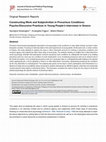
Journal of Social and Political Psychology, 2016
Precarity is becoming the paradigmatic description of young people’s work conditions in crisis-ri... more Precarity is becoming the paradigmatic description of young people’s work conditions in crisis-ridden Greece, but also in other European countries. Focusing on interview data on the work experiences of young adults (18-26 years old), in urban centres of Greece, this study attempts to explore the ways in which informants account for working in precarious conditions and construct agency and subjectivity within these ways of accounting. The analysis drawing on insights from critical discursive social psychology indicates that participants construct precarious work conditions as widespread and banal a) by treating precarious work as a sine qua non condition of youth employment, b) by considering precarious work as an inherent trait of the Greek job-market, c) by considering precarious work as a necessary step on a (biographical) path leading to the desired and/or appropriate job, or d) by adopting a “there is no other alternative” accounting, representing precarious job conditions as th...
Mis$it, 2020
Σκοπός του άρθρου είναι η αναστοχαστική ανάλυση του πώς οι συγκινήσεις (affects) που παράγονται γ... more Σκοπός του άρθρου είναι η αναστοχαστική ανάλυση του πώς οι συγκινήσεις (affects) που παράγονται για τον ερευνητή συγκροτούν μια πολιτισμική-υλική διεπαφή με την πολιτική οικονομία του Ελληνικού προσφυγικού καθεστώτος. Το ερευνητικό εργαλείο εδώ θα είναι ο κριτικός ερευνητικός αναστοχασμός, ο οποίος καταγράφει ενσώματα τις συνδέσεις των ερευνητικών πρακτικών με τις επήρειες και τα συναισθήματα που παράγονται από τα υποκείμενα του προσφυγικού καθεστώτος στο πεδίο, καθώς και την ψυχοπολιτική διακυβέρνησή τους. Αφετηρία του αναστοχασμού αποτέλεσε μια σύντομη συνομιλία με έναν επαγγελματία ψυχικής υγείας για την πρόσβαση σε εποπτικές συνεδρίες των επαγγελματιών στο πεδίο. Απώτερος στόχος είναι μια σύντομη συμβολή στην κριτική κοινωνικοψυχολογική συνάρθρωση της συγκινησιακής οικονομίας με την πολιτική οικονομία του προσφυγικού καθεστώτος.
Metalogos, 2020
Dimitris Papanikolaou in conversation with Giorgos Kesisoglou (translation in English)
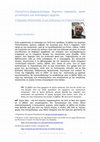
Μετάλογος , Jan 25, 2020
Όταν εμφανίστηκε το καλοκαίρι του 2018 στις προθήκες το βιβλίο του Δημήτρη Παπανικολάου, αμέσως ... more Όταν εμφανίστηκε το καλοκαίρι του 2018 στις προθήκες το βιβλίο του Δημήτρη Παπανικολάου, αμέσως τράβηξε την προσοχή μου. Αυτή η έκφραση, «κάτι τρέχει με την οικογένεια», μαζί με τα προσδιοριστικά του τίτλου, «έθνος, πόθος και συγγένεια την εποχή της κρίσης» ήταν σαν ένα κάλεσμα για μένα, το οποίο απευθυνόταν σε διάφορες αμφιβολίες και ελλείψεις που αντιλαμβανόμουν αναφορικά με τη σύγχρονη θεωρία της οικογένειας στην Ελλάδα. «Κάτι τρέχει», που ξεφεύγει από τον αναλυτικό φακό μας. Ξεφυλλίζοντάς το στο βιβλιοπωλείο, είδα με πολύ ενδιαφέρον ότι ο συγγραφέας δεν συζητούσε κλινικές περιπτώσεις ή τη βιβλιογραφία για την οικογένεια, αλλά σύγχρονα «πολιτισμικά κείμενα», ταινίες, βιβλία, κλπ, οικεία σε μένα, που με είχαν αναστατώσει τα περισσότερα όταν τα είχα συναντήσει. Δεν γράφει από τον χώρο των ψυ-επιστημών, αλλά από τις πολιτισμικές σπουδές και τη Νέα Ελληνική Φιλολογία, διδάσκοντας Νεοελληνική Λογοτεχνία στο κολέγιο St. Cross της Οξφόρδης από το 2004 . Σε αυτή την συνέντευξη με γραπτές ερωταποκρίσεις, θα προσπαθήσουμε να αναδείξουμε γιατί το βιβλίο αξίζει να τύχει της προσοχής των επαγγελματιών που ασχολούνται με την οικογένεια, συζητώντας τις κύριες έννοιες-επιχειρήματα που εισάγει.
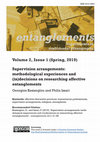
Entanglements Experiments in Multimodal Ethnography , 2019
In our submission, we explore a set of (in)decisions coming from the first author’s expérience in... more In our submission, we explore a set of (in)decisions coming from the first author’s expérience in the supervision arrangements of humanitarian professionals employed by N.G.Os in Greece to provide mental health care for refugees and migrants. Drawing on a fieldwork example from a postdoctoral research project on the affective/discursive practices of mental health professionals, we aim to highlight a multimodal way to analyse emergent affective entanglements as situated practices. In our example, we use an emotion episode during the first day of fieldwork, where the supervision discussion revolved around the accounts, affects and proposals of the participants on the organisational mess created the previous day in the N.G.Os healthcare services by a refugee: she did not receive her prescription, as she requested, so she exploded and created a fuss. This incident affected all the participants, so they brought it forth in the supervision discussion. Through this episode, we explore the meaningful multimodal integration of data: the depiction of the material arrangement of the supervision through photographs, the aural data coming from the soundscape created through the digital recording, the textual data coming from the transcription of the recorded supervision interaction, and last but not least, a pitch analysis of the emergent and in situ voicing of an affective/discursive practice of indignation by a participant. In this way, we aim to advance a way to infuse some multi-modal thinking on the critical discursive psychological analysis of affective/discursive practices.
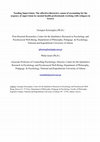
Greece in the past three years has been put in a position to address a massive and overwhelming i... more Greece in the past three years has been put in a position to address a massive and overwhelming influx of refugees moving mostly from the war afflicted areas of Syria, Afghanistan and Iraq. Such a massive movement came at a time of the most severe financial crisis, when little state attention or funding could be provided for the medical, mental health and psychosocial care, accommodation and integration of migrants or refugees. This condition opens up many issues for qualitative inquiry both with the mental health professionals as well as on the organisation of psychosocial services. The proposed submission draws on an ongoing post-doctoral project on the supervision needs and best practices of the mental health professionals working in the Greek refugee regime. We will focus on the accounts of mental health professionals who participated in the pilot phase of this project. Our data comes from a corpus of 35 in-depth, qualitative interviews, effected through purposive homogeneous sampling, designed to elicit their experiences supporting the refugees, their needs, their emotions and their ways of coping, while taking into account the local context of the embodied intersubjective relationship of researcher-participant. Through an interdisciplinary, critical psychosocial lens, drawing on recent theorising by Wetherell et al., we will address the research question of the affective/discursive practices mental health professionals mobilise to account for needing supervision, i.e. a structured relationship with experienced professionals with the goal of helping supervisees to cope in the field and gain the skills to be more effective. In our critical discursive psychological analysis, we will employ the concepts of the affective/discursive canon and the tropes of accounting to analyse the affective/discursive practices of mental health professionals as in situ, embodied and relational meaning-making work. Our findings suggest that participants mobilise taken-for-granted and common-sense tropes to position themselves as in urgent need of supervision due to the workload and the traumatic narratives of the refugees. They construct certain ‘affected’ positions of their professional practice with the refugees, oscillating between development and trauma, while establishing a relational canon of need. Such a normative positioning is discussed as evident not only of the affective economy of the Greek refugee regime, but also of the structural organisational deficits in its political economy. Finally, we aim to address the implications for policy-setting of psychosocial services and health care for the refugees, on the issue of the organisation of peer supervision practices for mental health professionals, with an inclusive multicultural and social justice approach.
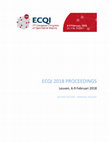
This presentation aims to reflexively explore the impact of the affects and positive or negative ... more This presentation aims to reflexively explore the impact of the affects and positive or negative emotions of mental health professionals working with refugees in the Greek context. We will also venture to contribute to the debate on whether affects of apprehension, compassion or fatigue can ultimately result in personal development and resilience, reinforced by clinical supervision depending on the professionals’ needs. The sample of this study consisted of six Greek mental health professionals, aged from 25 to 55, selected with purposeful homogeneous sampling from non-governmental mental health services. The data were collected through in-depth, semi-structured interviews. In the presentation, we will discuss data analysed with the methodology of Interpretative Phenomenological Analysis (IPA), focusing on the embodied reflexive becoming of the interactions with the participants. The main findings indicate that the experience of affect and positive or negative emotions of mental health professionals in their work with refugee clients can have an intense emotional impact which is conducive to the development of psychological resilience, while fostering greater self-awareness and meaning attributed to their work and life in general. In the interviews conducted, by listening with reflexive embodied empathy the dramatic accounts of the participants and the refugees’ hardships, the researchers were also affected, feeling emotions ranging from helplessness to joy. This emotional roller-coaster of the researchers’ resulted into the development of psychological agency, building of psychological resilience through the process of witnessing and acknowledging the situation while fostering a feeling of making a difference and a desire to contribute more in the refugee context. Another important finding involved an urgent call advanced by the participants for supervision by experienced on the field professionals in order to cope with the affects in the field. An important reflexive finding of this study was exactly the apprehension the researcher(s) couldn’t help but feel when the mental health professionals were asked to participate in the data collection. This in turn affected the researcher in a number of ways such as being a bit hesitant or worried before meeting with the participants. Therefore, we propose reflexively that both the precarious work conditions in the refugee context of Greece and the intense emotional impact of participants can affect the participants into assuming an apprehensive stance concerning their participation in the study and self-disclosing, which in turn brings to light the many ways that precarious work conditions in Greece can influence the research procedure




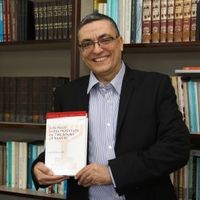






Uploads
Books by Georgios Kesisoglou
Με ποιους τρόπους κατανοούν και περιγράφουν τις συνθήκες επισφαλούς εργασίας; Πώς αντιλαμβάνονται την αμειβόμενη εργασία και από ποιους συμβολικούς πόρους αντλούν για να μιλήσουν για τις εργασιακές ταυτότητές τους; Υπάρχουν εναλλακτικά εργασιακά φαντασιακά;
Απέναντι στα ερωτήματα αυτά, οι συγγραφείς δίνουν το λόγο στις εργαζόμενες-ους και αναλύουν τις αφηγήσεις τους, χρησιμοποιώντας εργαλεία της κριτικής λογοψυχολογίας. Την ίδια στιγμή, υπερβαίνοντας τα όρια της κοινωνικής ψυχολογίας, επιχειρούν να αναδείξουν τις νοηματοδοτήσεις της εργασίας που νομιμοποιούν το status quo και να εντοπίσουν εκείνες που αμφισβητούν το κυρίαρχο εργασιακό ήθος. Η ανάλυσή τους φωτίζει τις σκιές της σύγχρονης μεταδημοκρατικής συνθήκης, εμβαθύνοντας στις διαδικασίες συγκρότησης του «νεοφιλελεύθερου υποκειμένου», μέσα από ένα χειραφετητικό κριτικό πρίσμα.
Όπως σημειώnει ο Αλέξανδρος Κιουπκιολής στον πρόλογο, ανάμεσα σε άλλα:
«Η παρούσα μελέτη της Κατερίνας Νικολοπούλου και του Γιώργου Κεσίσογλου για την εργασία και τις ταυτότητες στην Ελλάδα της κρίσης είναι μια δημιουργική και επίκαιρη συμβολή σε αυτή την «άλλη» έρευνα, η οποία φωτίζει διαφορετικά το πολιτικό και διανοίγει εναλλακτικούς ορίζοντες στην πολιτική σκέψη και δράση. Αξιοποιώντας τη μεθοδολογία και το εννοιολογικό οπλοστάσιο της κριτικής λογοψυχολογίας και δουλεύοντας με ημιδομημένες συνεντεύξεις, χαρτογραφούν τους ποικίλους και αντιφατικούς τρόπους με τους οποίους σύγχρονα υποκείμενα της εργασίας νοηματοδοτούν και διαχειρίζονται την κρίση, την ίδια την εργασία και την υποκειμενική θέση τους σε αυτή ως εργαζόμενοι/ες (…) Η μελέτη της Νικολοπούλου και του Κεσίσογλου δεν μνημονεύει απλώς αυτή τη συντακτική «βιοεξουσία από τα κάτω» που στέκεται απέναντι στη νεοφιλελεύθερη ηγεμονία. Αποτελεί η ίδια ζωντανή μαρτυρία της, τεκμήριο της πραγματικής δυνατότητας για μια άλλη συν-εργασία που δημιουργεί με χαρά και κόπο, παράγοντας από κοινού όχι μόνο μεταξύ των εμφανών πρωταγωνιστών (εδώ, των συγγραφέων) αλλά και με την κοινωνική πολλαπλότητα (εδώ, τις συνομιλήτριες και τους συνομιλητές).»
Papers by Georgios Kesisoglou
Με ποιους τρόπους κατανοούν και περιγράφουν τις συνθήκες επισφαλούς εργασίας; Πώς αντιλαμβάνονται την αμειβόμενη εργασία και από ποιους συμβολικούς πόρους αντλούν για να μιλήσουν για τις εργασιακές ταυτότητές τους; Υπάρχουν εναλλακτικά εργασιακά φαντασιακά;
Απέναντι στα ερωτήματα αυτά, οι συγγραφείς δίνουν το λόγο στις εργαζόμενες-ους και αναλύουν τις αφηγήσεις τους, χρησιμοποιώντας εργαλεία της κριτικής λογοψυχολογίας. Την ίδια στιγμή, υπερβαίνοντας τα όρια της κοινωνικής ψυχολογίας, επιχειρούν να αναδείξουν τις νοηματοδοτήσεις της εργασίας που νομιμοποιούν το status quo και να εντοπίσουν εκείνες που αμφισβητούν το κυρίαρχο εργασιακό ήθος. Η ανάλυσή τους φωτίζει τις σκιές της σύγχρονης μεταδημοκρατικής συνθήκης, εμβαθύνοντας στις διαδικασίες συγκρότησης του «νεοφιλελεύθερου υποκειμένου», μέσα από ένα χειραφετητικό κριτικό πρίσμα.
Όπως σημειώnει ο Αλέξανδρος Κιουπκιολής στον πρόλογο, ανάμεσα σε άλλα:
«Η παρούσα μελέτη της Κατερίνας Νικολοπούλου και του Γιώργου Κεσίσογλου για την εργασία και τις ταυτότητες στην Ελλάδα της κρίσης είναι μια δημιουργική και επίκαιρη συμβολή σε αυτή την «άλλη» έρευνα, η οποία φωτίζει διαφορετικά το πολιτικό και διανοίγει εναλλακτικούς ορίζοντες στην πολιτική σκέψη και δράση. Αξιοποιώντας τη μεθοδολογία και το εννοιολογικό οπλοστάσιο της κριτικής λογοψυχολογίας και δουλεύοντας με ημιδομημένες συνεντεύξεις, χαρτογραφούν τους ποικίλους και αντιφατικούς τρόπους με τους οποίους σύγχρονα υποκείμενα της εργασίας νοηματοδοτούν και διαχειρίζονται την κρίση, την ίδια την εργασία και την υποκειμενική θέση τους σε αυτή ως εργαζόμενοι/ες (…) Η μελέτη της Νικολοπούλου και του Κεσίσογλου δεν μνημονεύει απλώς αυτή τη συντακτική «βιοεξουσία από τα κάτω» που στέκεται απέναντι στη νεοφιλελεύθερη ηγεμονία. Αποτελεί η ίδια ζωντανή μαρτυρία της, τεκμήριο της πραγματικής δυνατότητας για μια άλλη συν-εργασία που δημιουργεί με χαρά και κόπο, παράγοντας από κοινού όχι μόνο μεταξύ των εμφανών πρωταγωνιστών (εδώ, των συγγραφέων) αλλά και με την κοινωνική πολλαπλότητα (εδώ, τις συνομιλήτριες και τους συνομιλητές).»
Κάτι τρέχει με την οικογένεια: Έθνος, Πόθος και Συγγένεια την εποχή της Κρίσης
Σελ. 448
Τιμή: €16.92
Εκδόσεις Πατάκη Αθήνα,
2018
Οι συμμετέχοντες στην έρευνα (40 άτομα, 18-26 ετών), προέρχονται από δυο ομάδες: α) νέες και νέοι της β' γενιάς μεταναστών, β) νέες και νέοι ελληνικής καταγωγής. Η αναλυτική διαδικασία υποδεικνύει τις ψυχο-λογοπρακτικές που χρησιμοποιούν στις συνεντεύξεις, όπου συναρμολογείται η κοινωνική ταυτότητα τους όσον αφορά το καθεστώς της επισφαλούς εργασίας. Χρησιμοποιήθηκαν αναλυτικά εργαλεία της κριτικής λογοψυχολογίας, όπως τα ερμηνευτικά ρεπερτόρια, οι θέσεις υποκειμένου, τα ιδεολογικά διλήμματα, οι αιτιολογικές εξηγήσεις και οι αξιολογικές εκτιμήσεις.
Ανάμεσα στα ευρήματα αυτής της διατριβής είναι: α) οι συμμετέχοντες στην έρευνα, αντιμέτωποι με τη συνθήκη του καθεστώτος επισφαλούς εργασίας, την κατασκευάζουν ως κοινότοπο καθεστώς (εργασίας): αυτός είναι ο ηγεμονικός προσανατολισμός στην ψυχο-λογοπρακτική της κοινοτοπο-ποίησης της επισφαλούς εργασίας· β) μέλημα των συμμετεχόντων ήταν να τοποθετούνται ως ελεύθερα, χωρίς περιορισμούς, “προκομμένα υποκείμενα”· γ) επίσης, η κινητοποίηση του ερμηνευτικού ρεπερτορίου της “προκοπής” αποτέλεσε υποστηρικτικό απόθεμα των τοποθετήσεων αυτών· δ) ένα άλλο ερμηνευτικό ρεπερτόριο ονομάστηκε η “διαδρομή της ζωής”: τα άτομα το κινητοποιούσαν αποσκοπώντας να οικοδομήσουν μια εργασιακή βιογραφία, με αρχή, μέση και τέλος, ως την κοινωνική αναγνώριση. Σε αυτή τη βιογραφική διαδρομή, ε) η εργασία αρθρώθηκε ως ένα ιδεολογικό δίλημμα: το κοινωνικό αντικείμενο της εργασίας διαρθρώθηκε στους πόλους της “δουλειάς του μόχθου” και της “καλής δουλειάς”, ανάλογα με την προσωπική επένδυση και τις αξιολογικές εκτιμήσεις, που κινητοποίησαν οι συμμετέχοντες.
Abstract
The present doctoral thesis explores the socio-economic and cultural integration of precariously employed young people in Greece, by using a qualitative psychological research design. The main research question focus on the ways with which the participants understand and represent, describe and construct, blame and/or legitimize in their everyday discourse the contemporary precarious working conditions, by articulating aspects of their social identities. The precarious work regime is evidenced as a socio-economic condition of the Greek society, which is connected with wider changes in the labour market.
The research sample consisted of 40 participants (both genders, aged 18-26), who came from two groups: a) second generation of migrants in Greece, b) Greek nationals. The data analysis was qualitative, aiming to pin-point the psycho-discursive practices mobilized in the semi-structured interviews, where their social identities were constucted vis-a-vis the precarious work regime. Analytic tools of critical discursive psychology were used, such as the interpretative repertoires, the subject positions, the ideological dilemmas, the causal and value attributions.
The results, discussed in accordance with the relevant literature, include: i) the research participants, facing the precarious work regime, construct it as a banal (work) regime: this is the hegemonic orientation to the psycho-discursive practice of banalization of precarity; ii) the participants mind to position themselves as free, without constraints, “effortful subjects; iii) they mobilized the repertoires of “effortfulness” and the “life's course”, in order to construct a hard-working (effortful) individual's work biography, with a beginning, a middle and an end, towards social recognition. In this biographical course, iv), work is articulated as an ideological dilemma: the social object of work is split in the two poles of “hard work” and “good work”, depending on the personal investment and the value attributions mobilized by the informants.